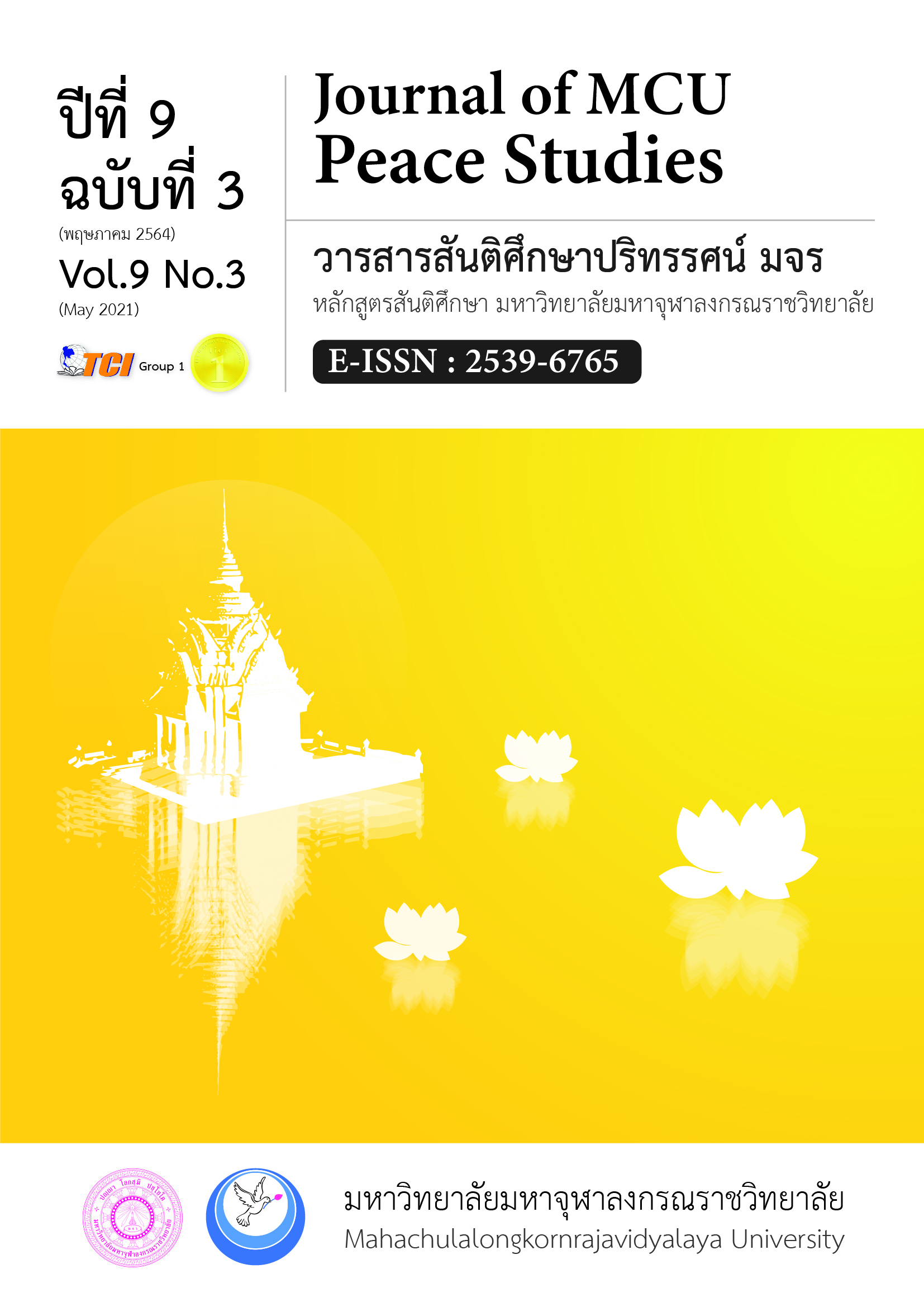Social Buddhist reflection in Kh Social Buddhist reflection in Khmer ghost stories
Main Article Content
Abstract
This research objectives are: 1) to find out the evolution of beliefs in Khmer ghosts; 2) to find out categories of Khmer ghosts; and 3) to find out a reflection of Buddhist society from Khmer ghost stories. The study is a qualitative research by using 100 Khmer ghost stories which
are categorized in four types: Khmer folk tale, ghost tale, short-story, and novel. The data were collected by surveying and collecting data from Cambodian documents and Khmer language website.
The results of the research find as follows: 1) The evolution of beliefs in Khmer ghosts: in the primeval time, there was a belief about ghosts that were in the nature e.g., water, woods, mountain, and there were as well the ancestor ghosts. With the arrival of Buddhism, people took in the beliefs of ghosts in Buddhism. When the tools for communication were developed, people took in the beliefs of ghosts from outside cultures as well; 2) Khmer ghosts can be categorized by their evolution into 3 groups: 1. The original ghosts which refer to those ghosts that have lived along with Khmer society since the primeval time, 2. Buddhist ghosts which refer to those arisen by the influence of Buddhist beliefs, and 3. Ghosts from external cultures which have emerged in Khmer society due to the advancement of communication; and 3) A reflection of Buddhist society from Khmer ghost stories. The social reflection in Khmer ghost story in the ancient spirit group, Khmer people believe that it was the ancestor spirits who provide tutelage and control people’s behavior and destine the happiness to the people. Buddhist spirits group are divided into three kinds according to the Buddhist texts: 1) sambhavesī (a spirit seeking or awaiting rebirth), 2) petre (a ghost of the departed), and 3) asurakāya (demons). As the external cultures spirit group was brought by Khmer people for entertainment and there is no ceremony for them. As the other social reflections from ghost stories were the beliefs in ghosts, superstition, Buddhism and ecology.
Article Details
Views and opinions expressed in the articles published by The Journal of MCU Peace Studies, are of responsibility by such authors but not the editors and do not necessarily reflect those of the editors.
References
Choatanyano, C. (1967). Dictionnaire Cambodgien. (5th ed.). Phnom Penh: Institut Bouddhique.
Hoc Dy, K. (2004). Piteehawpraleung (comfort ceremony). Phnom Penh: AngKor.
Kromtumnaimtumluab khmer. (2001). Prachumreungpreng Khmer Part8 (Cambodian Folk Tales). Phnom Penh: Rongpum Abrom.
Kimsun, S., & Van, S, (2009). Khmoc Derm Jek Chavia (Ghost on Large Banana Tree). Phnom Penh: Reading Books.
Kiang Eun, P. (2006). An Analysis of Social Reflections Shown in Korean Folktales. (Master’s Thesis). Graduate School: Srinakharinwirot University. Nakhon Pathom.
Lee, S. (2006). Piteehawpraleung Tamrabiabboran. (Royal ceremony According to the ancient ceremony). Phnom Penh: Meng Har Printing House.
Ly, T. (2012). Khoc wat Praputh (Ghost Preaputh Pagoda). Phnom Penh: Books World.
Mahachulalongkornrajavidyalaya Universiry. (2016). Man and Society. (3th ed). Bangkok: Mahachulalongkornrajavidyalaya Universiry Press.
Ngea, T. (1983). Pravattisas Khmer. (Khmer history). Phnom Penh: Rongpum Abrom.
Na Thalang, S. (2014). Folklore Theory. (3th ed). Bangkok: Chulalongkorn University Press.
Phally, S. (n.d.). Dangkhao Spirit (Millionaire Ghost). Phnom Penh: Taphrom.
Ratanakul, S. (2004). Non-human being in Eastern and Western Cultures. Humanities Journal, 5, 1-17.
Sanyavivatr S, (2550).Sociological Theory. (12th ed). Bangkok: Chulalongkorn University Press.
Soo, M. (2005). Ariyathor Khmer (Civilization Khmer). Phnom Penh: IIC Press.
Sotheary, K., & Sopheark, V. (2009). Khmoc Derm Jekchva (Ghost on Large Banana Tree). Phnom Penh: Reading Books.
Soy, S. (2015). Khoc Tiarrobos (Ghost requesting return treasure). Retrieved June 8, 2019, from https://news.sabay.com.kh/article/560428.
Sujjapun, R. (2001). Science and Art of Literature. Bangkok: Prsphansarn.
Yongboonkerd, C. (2014). Record of the traditions of Jhenla. (3th ed). Bangkok: Matichon.
Yuk, Th. (2004). Pisac Saneha (Devil's love). Phnom Penh: n.p.


